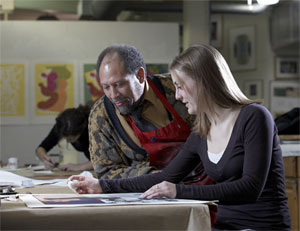His artwork also is placed in the permanent collections of the U.S. Embassy in Limon, Costa Rica; The Philadelphia Museum of Art; and the LaGrange Art Museum in Georgia
 Curlee Holton, professor of art and director of the Experimental Printmaking Institute (EPI), recently returned from Costa Rica, where he presented workshops on African American culture and history to the residents of a coastal community.
Curlee Holton, professor of art and director of the Experimental Printmaking Institute (EPI), recently returned from Costa Rica, where he presented workshops on African American culture and history to the residents of a coastal community.
In addition, a piece of artwork by Holton and Janet Taylor Pickett, a former EPI residency artist, will be included in the permanent collection of the U.S. Embassy in Limon, Costa Rica. Holton’s work will also be placed in the permanent collections of The Philadelphia Museum of Art and the LaGrange Art Museum in LaGrange, Ga.
EPI is committed to collaboration and education through the printmaking process. Sponsored by the U.S. Embassy, this trip was part of EPI’s Global Exchange Project.
One of the hallmarks of EPI is bringing in renowned artists from the U.S. and around the world to work with Lafayette’s art students. The students help with the printmaking process and the artwork is exhibited in numerous galleries and exhibits. Although no Lafayette students accompanied him on this Costa Rican trip, the Global Exchange Project will take Holton and students to other parts of the world on upcoming projects.
This recent project, “Echoes in the Blood,” was an outgrowth of a discussion during a visit last year to San Jose for an exhibition organized by EPI. Centro Cultural, the programming organization affiliated with the Costa Rican Embassy, wanted to do programming in the Limon Provence on the Caribbean coast of Costa Rica.
The trip involved an exhibition in San Jose at the Costa Rican Embassy’s Cultural Center and another in Limon.
While in Limon, Holton and the other participants presented workshops and lectures on African American culture and history as a way of helping the Limon inhabitants engage their cultural legacy. The Limon community is made up of Afro-Costa Ricans, descendants of Jamaicans who came to Costa Rica in 1840 to help build the railroad system. They have since integrated into the social and cultural fabric of Costa Rica, but still face racial discrimination.
“The goals of this project were to introduce art-making processes as a form of documentation and cultural engagement, to help the workshop participants give voice to their history and personal stories, and to help them rescue their cultural legacy in the face of the challenges of modern life,” Holton says.
He was accompanied by Pickett and Dr. Robert Steele from the University of Maryland, who serves on EPI’s board of advisers. Assisting with the workshop was a student from the University of Costa Rica who will be an EPI intern at Lafayette this fall.
